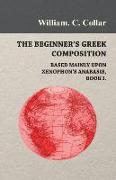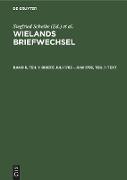- Start
- The Beginner's Greek Composition - Based Mainly Upon Xenophon's Anabasis, Book I
The Beginner's Greek Composition - Based Mainly Upon Xenophon's Anabasis, Book I
Angebote / Angebote:
PREFACE. COLLEGE admission requirements in writing Greek practically determine the scope and fix the aim of instruction in the schools. Though these requirements vary in degree, they point to the same end - power and knowledge of the language sufficient for translating easy narrative or address into Attic Greek. So far as amount of acquisition can be approximately measured, nothing could be more reasonable and just. By working consciously and definitely toward that goal by the best method, the learner is sure to derive the highest benefit that the study can yield. but what is the best method, or at least, a mood method It is now pretty generally admitted that it is not one that divides and divorces writing from reading. Assuming that the learner has a good mastery of inflections and such knowledge of simpIe constructions as is ordinarily acquired in the first years study, the basis of exercises for beginners should be a Greek text that he has read and studied with care. In this way the learner turns to account not only all that he has consciously acquired, but what, on the whole, is of greater importance, all that he has unconsciously absorbed. The question then arises, shall practice in writing be applied to and accompany a large area of text, or shall it rest in the elementary stage upon a limited portion of an author The editors, as -ill be seen, have chosen the latter alternative, and have based the main part of the exercises upon the first book of Xenophons Anabasis. The method assumes of necessity, and this is conceived to be one of its chief recommendations, great familiarity with the original. Such a ready command of the Greek original can neither be required nor expected of more than a limited amount of text. Nor is it essential. Not all of the seven books of Xenophons Anabasis, for example, afford illustrations of every Greek construction but any one book furnishes more than most students master. The case is not the same as in Latin, where a much. wider and more various reading precedes and accompanies Latin Composition. Another consideration carries with it great weight. Since the power of the student, at the end of his preparatory course, to translate con- nected English of some complexity into Greek is the measure and test, on one side, of his grasp of the language, it should obviously be greatly to his advantage to be practised from the beginning in dealing with simple, but still continuous English. This principle of continuity in the exercises, so seemingly necessary, if the student is to catch the essential spirit and style of the Greek, is the distinguishing characteristic of this book. In no part and in no single exercise are the sentences detached and unrelated. The sentences for oral translation, though short, simple, and for convenience, numbered, substantially repeat in altered form, the story of the original. Finally the young learner must be launched upon waters less familiar and cease to hug a known coast. In other words from reproducing, in a sense, an original that he has seen, he must reprocluce an original that he has not seen. The transition would, as yet, be too abrupt to passages based on no Greek text. The style and vocabulary should not be quite unlike what he has become familiar with. Accordingly the book concludes with longer English passages, which art largely transIations from different works of Xcnophon, and include a few recent harvard entrance examination papers, with here and there a note...
Folgt in ca. 15 Arbeitstagen




